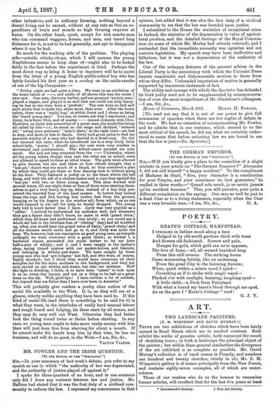MR. FOWLER AND THE IRISH QUESTION.
Pro nue EDITOR OP THZ ..erscmProa."1 SIR,—In your summary of last week's debate, you refer to my speech as one in which " the authority of law was depreciated, and the authority of justice played off against it."
I spoke for three-quarters of an hour, and in one sentence only did I draw any contrast between law and justice. Mr. Balfour had stated that it was the first duty of a civilised com- munity to enforce the law. I expressed my concurrence in that
opinion, but added that it was also the first duty of a civilised community to see that the law was founded upon justice.
I submitted to the House the statistics of exceptional crime in Ireland, the statistics of the depreciation in value of agricul- tural produce, and the detailed findings of the Royal Commis- sion (to some of which Mr. Morley had already referred), and I contended that the immediate necessity was agrarian and not coercive legislation. My speech may have been ineffective and fallacious, but it was not a depreciation of the authority of the law.
One of the unhappy features of the present schism in the Liberal Party is the persistency with which the Unionist Press impute unpatriotic and dishonourable motives to those from whom they differ. Unfounded imputation of motive is generally supported by inaccurate statement of fact.
The ability and courage with which the Spectator has defended its Irish policy need not to be supplemented by misrepresenta- tion of even the most insignificant of Mr. Gladstone's colleagues. —I am, Sir, Ac.,
House of Sammons, Harsh 29th. HENRY H. FOWLER.
[We need not say that it is out of our power to give fall summaries of speeches when there are live nights of debate in the week. We had no intention of misrepresenting Mr. Fowler, and he admits that in one sentence, which seemed to us the most critical of his speech, he did say what we certainly under- stood to mean that before enforcing law we are bound to see that the law is just.--En. Spectator.]


































 Previous page
Previous page